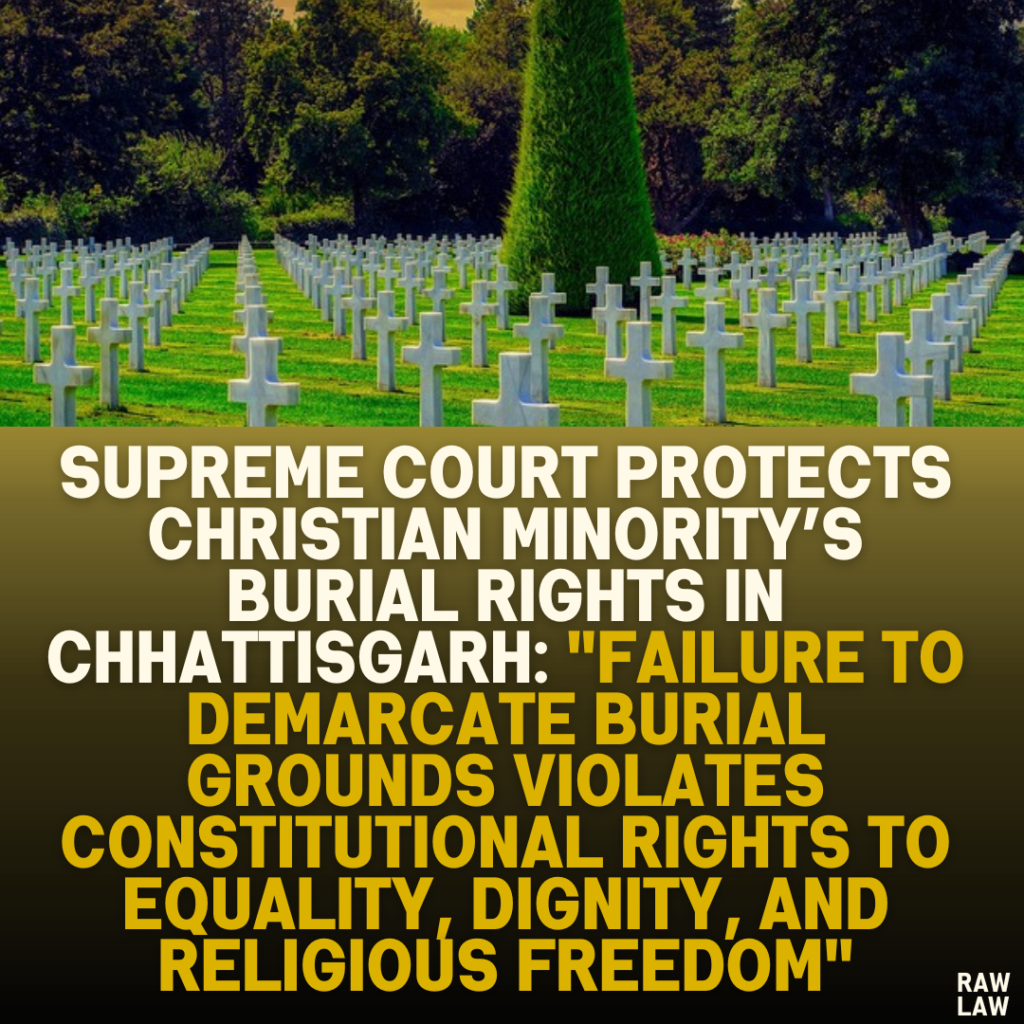1. Court’s Decision
The Supreme Court overturned the High Court’s dismissal of the appellant’s plea, allowing the appellant to bury his father on private agricultural land in the village of Chhindwada, Chhattisgarh. The Court emphasized that every individual deserves dignity in death and directed the State to ensure the burial took place peacefully and with adequate protection.
Additionally, the Court ordered the State to identify and demarcate exclusive burial sites for Christians throughout Chhattisgarh within two months. This directive aims to prevent future conflicts and ensure the rights of all communities are respected.
2. Facts
- Background of the Case: The appellant, a third-generation Christian of the New Apostolic Church, sought to bury his father in Chhindwada, a village where their family had lived for generations. His ancestors and relatives were also buried in the same graveyard.
- Events Leading to the Case: After his father passed away on January 7, 2025, the appellant and his family attempted to bury him in a section of the village graveyard traditionally used by the Christian Mahra community. However, villagers opposed this burial, citing religious and customary grounds. Local authorities, including the police, also refused to intervene, leaving the appellant with no choice but to keep his father’s body in a mortuary for over three weeks.
- High Court Proceedings: The appellant approached the Chhattisgarh High Court, seeking permission to bury his father in the village graveyard or, alternatively, on his private land. The High Court dismissed the plea, citing the risk of public unrest and directing the burial to a graveyard 20-25 km away in Karkapal. This led the appellant to appeal to the Supreme Court.
3. Issues
- Right to Burial in Native Village Graveyard: Does the appellant have the constitutional right to bury his father in the village graveyard where his ancestors were buried?
- Failure of Gram Panchayat: Did the Gram Panchayat fail in its duty to designate burial grounds for Christians, thereby violating constitutional and statutory obligations?
4. Petitioner’s Arguments
- Established Custom: The appellant argued that Christians in the village had been burying their dead in a specific section of the village graveyard for decades, based on oral permission from the Gram Panchayat.
- Violation of Fundamental Rights:
- Article 14: The appellant argued that the denial of burial rights based on religion amounted to discrimination and violated the principle of equality before the law.
- Article 15(1): The refusal to allow burial in the village graveyard was an act of discrimination based on religion.
- Article 21: The appellant emphasized the right to dignity in death as part of the right to life.
- Alternative Relief: If burial in the village graveyard was not possible, the appellant requested permission to bury his father on his private agricultural land.
5. Respondent’s Arguments
- Designation of Burial Grounds: The State argued that a designated burial ground for Christians existed in Karkapal, 20-25 km away, and was used by Christians from neighboring villages, including Chhindwada.
- Public Order Concerns: Allowing the burial in Chhindwada could lead to public unrest and disharmony in the village.
- Customary Practices: The Gram Panchayat claimed that no formal graveyard for Christians existed in Chhindwada and that previous burials were exceptions, not the norm.
6. Analysis of the Law
The Court examined the relevant laws, including:
- Chhattisgarh Panchayat Raj Adhiniyam, 1993: Empowers Gram Panchayats to regulate burial sites.
- Chhattisgarh Gram Panchayat (Regulating Places for Disposal of Dead Bodies) Rules, 1999:
- Rule 3: Mandates the disposal of corpses within 24 hours of death in accordance with the deceased’s religious customs.
- Rule 5: Requires Gram Panchayats to approve and demarcate burial sites.
- Rule 8: Prohibits burials outside designated areas.
The Court found that the Gram Panchayat had failed to formally designate a burial ground for Christians in Chhindwada, violating its statutory duty under Rule 5.
7. Precedent Analysis
The Court referred to:
- Ashwini Kumar Upadhyay v. Union of India (2023): Highlighted the importance of fraternity and harmony among diverse communities.
- Bijoe Emmanuel v. State of Kerala (1986): Emphasized tolerance as a core constitutional value.
- Maneka Gandhi v. Union of India (1978): Affirmed the right to dignity under Article 21.
8. Court’s Reasoning
- Failure of Local Authorities: The Gram Panchayat’s failure to demarcate a burial site for Christians led to unnecessary conflict and social ostracism of the appellant’s family.
- Violation of Constitutional Rights: The Court held that denying burial rights based on religion violated Articles 14, 15(1), and 21. It rejected the argument that public unrest justified such discrimination.
- Practical Considerations:
- The Court noted that previous Christian burials in the village graveyard had occurred without incident.
- The claim that Karkapal was the designated burial ground was not supported by evidence.
- Need for Fraternity: The Court emphasized the constitutional principle of secularism and the need to foster harmony among communities.
9. Conclusion
The Supreme Court issued the following directives:
- Burial in Private Land: The appellant was permitted to bury his father on his private agricultural land in Chhindwada.
- Protection for the Appellant: The State was directed to provide police protection to ensure the burial took place peacefully.
- Demarcation of Burial Grounds: The State was ordered to identify and designate exclusive burial grounds for Christians throughout Chhattisgarh within two months.
The Court stressed the importance of ensuring dignity in death for all citizens, regardless of their religion or community.
10. Implications
This judgment has far-reaching implications:
- Reinforcement of Minority Rights: It affirms the constitutional protections available to minority communities, particularly in matters of religious practices and dignity in death.
- Accountability for Local Authorities: The ruling highlights the responsibility of Gram Panchayats to ensure inclusivity and respect for all communities.
- Promotion of Fraternity and Secularism: The judgment underscores the need for harmony among diverse religious groups in a pluralistic society like India.
